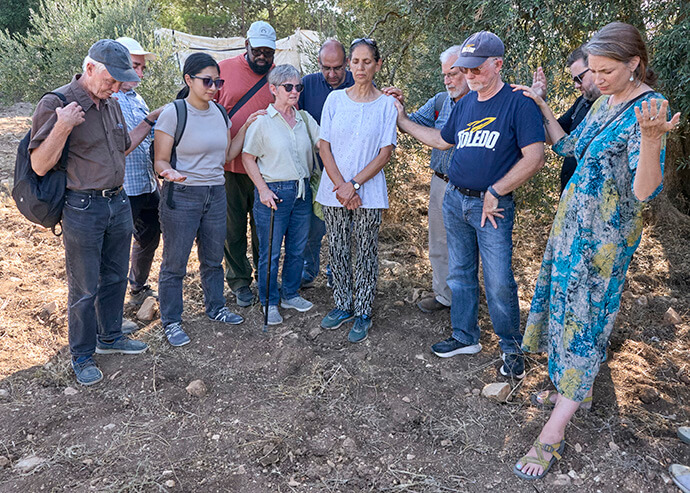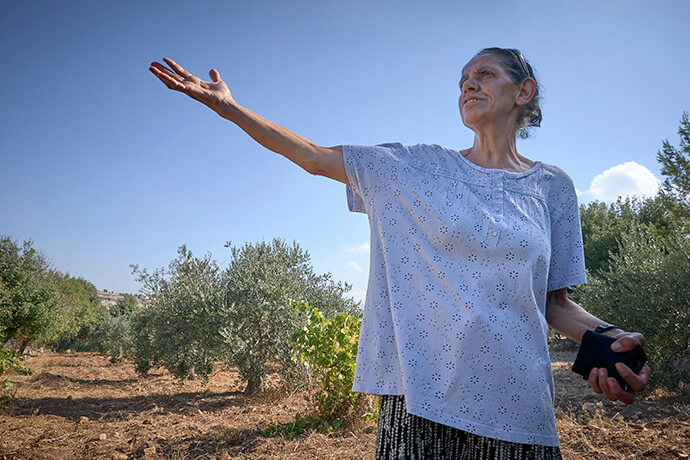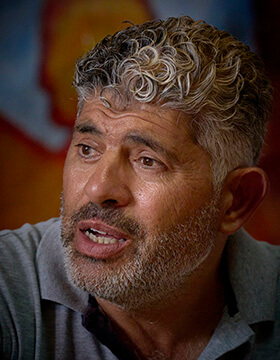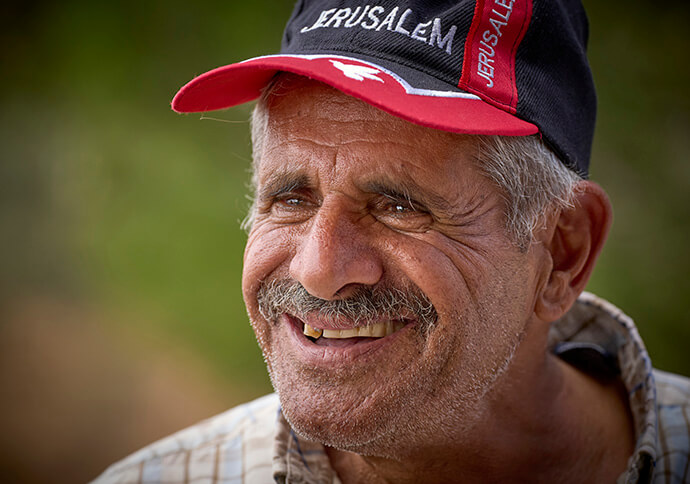Key Points:
- Amid increased harassment from Israeli settlers, a Lutheran Palestinian family continues its nonviolent struggle to keep the “Tent of Nations” farm.
- The Nassars bought the farm in 1916 as a sign of encouragement to local Christians, many of whom were beginning to emigrate. In 1991, the farm was declared state land, and the Nassars began a legal struggle to keep it.
- Many of the international observers who’ve visited the farm come from church groups. The United Methodist Board of Global Ministries has supported the farm, and in 2018 the World Methodist Council gave the farm its annual peace award.
- “Nonviolent resistance is key to change,” said Daoud Nassar, who runs the farm with his siblings. “We might not see the outcome of that work immediately, but in the long run we have to succeed.”
As violent conflict worsens between Israeli settlers and Palestinians in the occupied West Bank, a small band of organic farmers in the hills southwest of Bethlehem struggles to keep alive the slender hope that there’s another way.
The sign at the entrance to their farm sums it up: “We refuse to be enemies.”
The Nassars, a Lutheran Palestinian family, bought the farm in 1916 as a sign of encouragement to local Christians, many of whom were beginning to emigrate. The family registered the land with the Ottomans, and in the early years, members lived in caves while caring for their olives, almonds and grapes.
As political powers came and went in the century that followed, they kept their legal claim intact, as well as their original vision of Christian witness. Following the establishment of Israel in 1948, with the West Bank under Jordanian control, Bishara Nassar made the farm a center of music and Bible study to strengthen and preserve the Christian community.
That changed after Israel occupied the West Bank in 1967 and Israeli settlers started moving into the area. In 1991, the farm was declared state land, and the Nassars began a long and complicated legal struggle to retain possession.

Following last October’s Hamas assault on Israel and the subsequent Israeli war in Gaza, the situation in the West Bank has grown tense and more violent.
The United Methodist Church officially supports a two-state solution, recognizing Israel’s right to exist and opposing the confiscation of Palestinian lands, and it calls for interfaith and ecumenical dialogue to bring about greater understanding and peace.
Church statements on peace
in the Middle East
The United Methodist Church officially supports the continuing existence of the Jewish people and their covenant with God, Palestinian self-determination and Israel’s right to exist.
“Within The United Methodist Church, we struggle with our understanding of the complexity and the painfulness of the controversies in which Christians, Jews, and Muslims are involved in the Middle East,” the church states in its Book of Resolutions. “The issues include disputed political questions of sovereignty and control, and concerns over human rights and justice. We recognize the theological significance of the Holy Land as central to the worship, historical traditions, hope, and identity of the Jewish people. We are mindful of this land’s historic and contemporary importance for Christians and Muslims.”
For more information on The United Methodist Church’s statements on peace in the Middle East, see these entries in the Book of Resolutions:
United Methodist Guiding Principles for Christian-Jewish Relations
Opposition to Israeli Settlements in Palestinian Land
“We are committed to the security, safety, and well-being of Jews and Palestinians in the Middle East, to respect for the legitimacy of the state of Israel, to justice and sovereignty for the Palestinian people, and to peace for all who live in the region,” the church states in its Book of Resolutions.
The church also said it “encourages our members around the world to develop a balanced understanding of the concerns and perspectives of both Palestinians and Israelis, being careful to lift up the voices of those victims of violence and injustice across the region, and rejecting oversimplified efforts to simply ‘blame’ one side or the other.”
The Nassar family’s legal battle to maintain possession of their land continues. Hearings on their case are currently scheduled for Oct. 8 and Dec. 18. However, what people here call “the facts on the ground” matter far more than court decisions.
For the Nassars, that means increased threats and attacks from Israeli settlers, who have built roads on the Nassars’ property and cut down hundreds of olive trees. Although several modern Israeli settlements have been built around the farm, the largest with 65,000 people, the Nassars aren’t allowed to hook up to the electrical grid or drill a well on their land. The main road into the farm has been closed, forcing a long detour to transport produce or pay a visit. This year, the closures forced them to cancel their regular summer camps for Palestinian children.
In May, settlers built a road and parked a camping trailer right outside the farm’s fence. They come some nights and play loud music directed at the farm. In the West Bank, such behavior is usually followed by settlers claiming they feel threatened by neighboring Palestinians, leading Israeli soldiers to expel the Palestinians, no matter how long they’ve lived there.
Daoud Nassar, who runs the farm with his siblings Amal and Daher, said the trailer is clearly a provocation, but the family has declined offers from Israeli human rights groups to openly confront the settlers.
“The settlers are seeking confrontation, which will make it easier for the Israeli army to declare the area a military zone and kick us out. So our strategy is to keep this place as calm as possible. Israeli peace activists would like to help, but usually the settlers simply wait until the Israeli activists leave, then they attack in the night,” Daoud Nassar said.

What the Nassars have done is invite foreigners to come to their farm, which they years ago dubbed the “Tent of Nations,” acknowledging its symbolism as a place where people of different backgrounds can live together peacefully. International observers help harvest the crop, but also document the aggression against the farm. Settlers seem more restrained when foreign observers are watching, in part because many settlers are from the United States and are afraid of legal sanctions if they are photographed participating in an activity that the U.S. and other governments have long deemed illegal.
“If something happens, we can’t go to the Palestinian police, as they’re not allowed to come here. We can report it to the Israeli police, but they won’t take any action against the settlers. But the more international volunteers we have, the more protected we feel,” Daoud Nassar said.

“This situation might force many people to react violently, or to sit and cry, or to give up and leave. But we will continue with our nonviolent struggle. We will refuse to be victims. We will refuse to hate. And we’ll continue to believe in justice.”
Given the militarized geography of the occupied West Bank, with separate roads and legal systems for Israeli settlers and Palestinians, even though they might live in close proximity, just having simple conversation across cultures is difficult. Amal Nassar said that when settlers have come to the farm and been asked to leave, they respond by saying that God has given the land to the Israelis and that the Palestinians will have to leave one way or another.
Yet she recalled one rare moment when she encountered an older woman, a settler from the United States, while walking on a nearby road. The two women stopped to talk.
“I told her I was her neighbor, and she responded by saying the settlement had no neighbors. ‘There are no neighbors, no other people here,’ she told me,” Amal Nassar said.
“I told her that I was indeed her neighbor, and that the settlements were kicking people off their land, demolishing houses, killing children. I told her she was living on Palestinian land, and that she could have a swimming pool but I wasn’t allowed to dig a well or have a building permit. She said she didn’t know about any of that. ‘I am not sure about what you say,’ she said. So I told her, ‘If you don’t believe, come and see.’ But she said, ‘I’m not allowed to visit Palestinians.’ That’s a policy of theirs that prevents anyone from opening their eyes, and that allows them to continue characterizing Palestinians as dangerous, as terrorists, as killers. I told her that we had to figure out a way to share, or none of us will be able to live in peace.”

Many of the international observers who’ve visited the farm come from church groups, which have played a critical role in protecting the Tent of Nations from worse violence. The United Methodist Board of Global Ministries has supported the farm, and in 2018 the World Methodist Council gave the farm its annual peace award.
Yet the struggle goes far beyond the fate of the Nassar farm. Daoud Nassar believes the continuing presence of Palestinians in the Holy Land, especially Christians, is at stake.
Subscribe to our
e-newsletter
“As the situation here grows more desperate, many Palestinian farmers are forced to leave. The Israelis are quick to say, ‘We didn’t force anyone to leave.’ But the reality of life on the ground makes it impossible for many to stay,” Daoud Nassar said.
“That’s why our mission here is important. We want to prove that nonviolent resistance is key to change. We might not see the outcome of that work immediately, but in the long run we have to succeed. The train of giving up already left the station. We have to succeed. There is no other way.”
A century ago, when their grandparents bought the farm, the Bethlehem area was almost all Christian. Today, Christians are probably less than 10 percent of the local population.
“We need to stay as witnesses, especially in these difficult times. Christian Palestinians are leaving the country, and we are becoming a small minority,” Daoud Nassar said. “Yet we’re the salt of the earth and the light of the world. Our mission is to show people that there is a better way and that there is hope for a better future. But that better future will never be given as a gift from others. We have to shape it ourselves.”
Jeffrey is a photojournalist and founder of Life on Earth Pictures. He lives in Oregon.
News media contact: Julie Dwyer at (615) 742-5470 or [email protected].
Learn more

Pilgrimage for peace in the Holy Land





